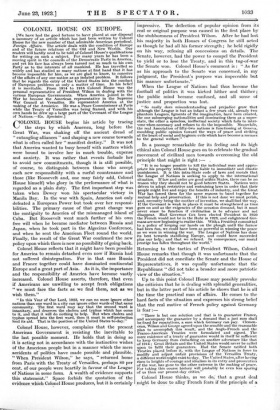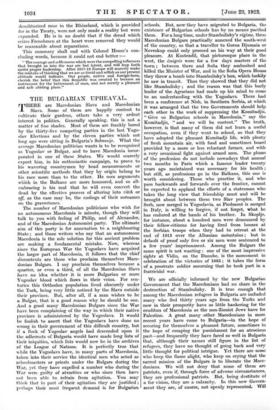COLONEL HOUSE ON EUROPE.
(We have had the good fortune to have placed at our disposal a summary of an article which has just been written by Colonel House for the new number of that admirable American periodical, Foreign Affairs. The article deals with the condition of Europe and of the future relations of the Old and New Worlds. Our readers will hardly need to be told of Colonel House's qualifications for writing on such a subject. For many years he has been a moving spirit in the councils of the Democratic Party in America, and yet his face has always been turned not so much to his own Party as to the interests of all mankind. He has travelled so widely and has studied so many nations at first hand that it has become impossible for him, as we are glad to know, to conceive of the affairs of any one nation as an isolated problem. It follows that he regards the entry of the United States into the conduct of European problems as only a matter of time. In his belief it is inevitable. From 1914 to 1916 Colonel House was the personal representative of President Wilson in dealing with the various European Governments. When America joined in the War he became the American representative in the Supreme War Council at Versailles. He represented America at the making of the Armistice. He was a Peace Commissioner at Paris while the Treaty of Versailles was being framed, and with his own hands he drew-up a large part of the Covenant of the League of Nations.—En. Spectator.] COLONEL HOUSE begins his article by tracing the steps by which America, long before the Great War, was shaking off the ancient dread of " entangling affiances " and shaping a new course towards what is often called her " manifest destiny." It was not that America wanted to busy herself with matters which were bound to involve her in much trouble, expense and anxiety. It was rather that events forbade her to avoid new commitments, though it is still possible, of course, to distinguish between those who accept each new responsibility with a rueful countenance and those (like Roosevelt and, one may fairly add, Colonel House himself) who glory in the performance of what is regarded as a plain duty. The first important step was taken when Dewey won his spectacular victory in Manila Bay. In the war with Spain, America not only defeated a European Power but took over her responsi- bilities. The primary cause of that great change was the contiguity to America of the mismanaged island of Cuba. But Roosevelt went much further of his own free will when he became mediator between Russia and Japan, when he took part in the Algeciras Conference, and when he sent the American Fleet round the world. Finally, the result of the Great War confirmed the new policy upon which there is now no possibility of going back.
Colonel House reflects that it might have been possible for America to remain detached even now if Russia had not suffered disintegration. For in that case Russia and France together could have dominated continental Europe and a great part of Asia. As it is, the importance and the responsibility of America have become vastly increased. Colonel House asserts, therefore, that even if Americans are unwilling to accept fresh obligations " we must face the facts as we find them, not as we wish them."
" In this Year of Our Lord, 1928, we can no more ignore other nations than one ward in a city can ignore other wards of that same community. The first ward may say that the second ward is insanitary, and deserves the cholera and typhus which has come to it, and that it will do nothing to help. But when Cholera and typhus spread into the first ward, then it must in self-protection lend its aid. That is the position of the United States to-clay."
Colonel House, however, complains that the present American Government is resisting the inevitable to the last possible moment. He holds that in doing so it is acting not in accordance with the instinctive wishes of the American people but in a manner which the mere accidents of politics have made possible and plausible. " When president Wilson," he says, "returned home from Paris. with the Treaty of Versailles, perhaps 80 per cent. of our people were heartily in favour of the League of Nations in some form. A wealth of evidence supports this statement." Space forbids the quotation of the evidence which Colonel House produces, but it is certainly impressive. The deflection of popular opinion from its real or original purpose was caused in the first place by the stubbornness of President Wilson. After he had lost his majority in both Houses of Congress he still acted as though he had all his former strength ; he held rigidly on his way, refusing all concessions on details. The Senate, however, had the power to compel the President to yield or to lose the Treaty, and in this tug-of-war the Senate won. Colonel House's comment is : " As far as his approach to the Senate was concerned, in my judgment, the President's purpose was impeccable but his manner unfortunate."
When the League of Nations had thus become the football of politics it was kicked hither and thither ; the public mind became confused, and all sense of justice and proportion was lost.
" So easily does misunderstanding and prejudice grow that although the League is but an infant a few years old, already two phantom Leagues, figments of the imagination, have been created, the one submerging nationalities and dominating them as a super- state, the other a spineless, ineffectual society which fails to inter- vene when necessary and refuses to do the impossible. Meanwhile, the real Association of fifty-two nations is functioning at Geneva, moulding public opinion toward the ways of peace and striking at the heart of social and hygienic evils which have become a menace to the general welfare."
In a passage remarkable for its feeling and its high ethical aim Colonel House goes on to celebrate the gradual movement of civilized men towards overcoming the old principle that might is right :— " It is no longer possible to kill the individual man and appro- priate his property without being liable to immediate and drastic punishment. It is this intra-State code of laws and morals that the League of Nations is seeking to apply to the international situation. If law and order are good within 'States, there can be no reason why they should not be good between States. Nations were driven to adopt restrictive and restraining laws in order that their people might live and enjoy the benefits of industry, and the Great War has forced them for the same reasons to band together for mutual help and preservation. If this is not done we must perish, and, necessity being the mother of invention, we shall find the way. If the Covenant is weak in places it must be strengthened as time goes on and as the exigencies of the occasion demand, but it must never cease to function if civilization is to advance and not disappear. Had Governor Cox been elected President in 1920 the French would not be in the Ruhr in 1928, and enlightened Ger- mans are now beginning to realize this. With a President committed to a policy of keeping our hands on the plough until the furrow had been run, we could have been as powerful in winning the peace as we were in winning the war. The League of Notions has done its best towards stabilizing Europe, and could have succeeded plus our help ; and that we refused. In consequence, our moral prestige has fallen throughout the world."
Returning to the tactics of President Wilson, Colonel House remarks that though it was unfortunate that the President did not conciliate the Senate and the House of Representatives, it was equally unfortunate that the Republicans " did not take a broader and more patriotic view of the situation."
Up to this point Colonel House may possibly provoke the criticism that he is dealing with splendid generalities, but in the latter part of his article he shows that he is all the time the practical man of affairs. He comes to the hard facts of the situation and expresses his strong belief that the real motive of French policy against Germany is fear:— "There is but one solution and that is to guarantee France, and accompany the guarantee by a demand that a just sum shall be, fixed for reparations, a sum which Germany can pay. Clemen- ceau, Wilson and George agreed upon the sensible and the reasonable plan to accomplish this result, and the Anglo-French and the Franco-American Treaties were formulated and signed. The mere existence of a treaty of guarantee would in itself be sufficient to keep Germany from embarking on another adventure like that of 1914 ; Great Britain and the United States would never be called upon to fulfil their guarantees. Had the Senate ratified both Treaties placed before it, with the League of Nations in force to modify and adjust unfair provisions of the Versailles Treaty, a different world might exist to-day. The United States, after having risen to heights of courage and idealism in its entry and prosecution of the war, has- gone to the other extreme in the making of peace. For taking this course history will probably be even less sparing of us than our present-day critics."
Colonel House thinks, as we do; that a great deal _might be done to allay French fears if the principle of a demilitarized zone in the Rhineland, which is provided for in the Treaty, were not only made a reality but were expanded. He is in no doubt that if the dread which seizes Frenchmen at the heart were removed they would be reasonable about reparations.
This summary shall end with Colonel House's con- cluding words, because it could not end better
The courage and selflessness which were the compelling influences that brought us into the war are but latent, and will leap forth under proper leadership. After 1917-18 Europe will scarcely make the mistake of thinking that we are as timid and selfish as our present attitude would indicate. Our people, native and foreign-born, cherish the belief that this Republic was created to become an instrument for the betterment of man, and not merely a pleasant and safe abiding place."











































 Previous page
Previous page